Unit 3 Grammar 必修3 语法课
高中英语Unit3TraveljournalSectionⅢGrammar教案新人教版必修
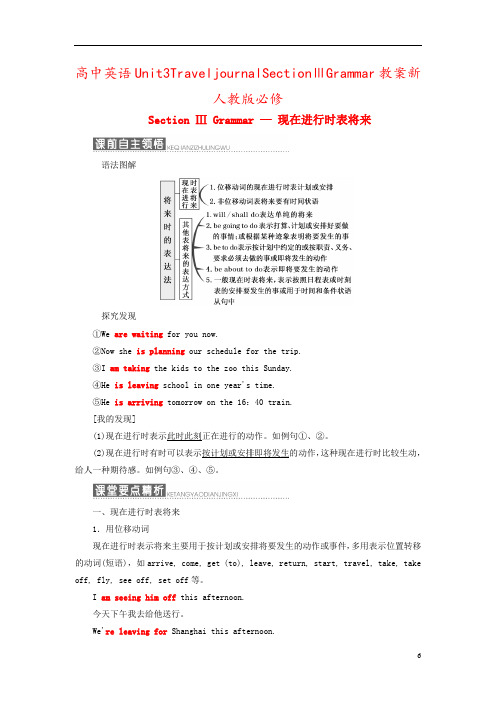
高中英语Unit3TraveljournalSectionⅢGrammar教案新人教版必修Section Ⅲ Grammar —现在进行时表将来语法图解探究发现①We are waiting for you now.②Now she is planning our schedule for the trip.③I am taking the kids to the zoo this Sunday.④He is leaving school in one year's time.⑤He is arriving tomorrow on the 16:40 train.[我的发现](1)现在进行时表示此时此刻正在进行的动作。
如例句①、②。
(2)现在进行时有时可以表示按计划或安排即将发生的动作,这种现在进行时比较生动,给人一种期待感。
如例句③、④、⑤。
一、现在进行时表将来1.用位移动词现在进行时表示将来主要用于按计划或安排将要发生的动作或事件,多用表示位置转移的动词(短语),如arrive, come, get (to), leave, return, start, travel, take, take off, fly, see off, set off等。
I am seeing him off this afternoon.今天下午我去给他送行。
We're leaving for Shanghai this afternoon.今天下午我们将动身去上海。
The plane is arriving in 10 minutes.飞机将在10分钟内到达。
[即时演练1] 补全句子①She is_leaving_for Singapore tonight.她今晚将动身去新加坡。
②When are_you_setting_off_for your holiday?你什么时候动身去度假?③His plane is_taking_off at 9:20, so he must be at the airport by 8:30.他乘坐的飞机将于9:20起飞,所以他必须在8:30之前赶到机场。
人教版高一英语必修三 unit3 Grammar 名词性从句-宾语从句和表语从句课件
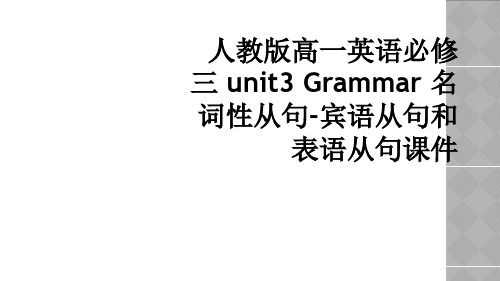
人教版高一英语必修 三 unit3 Grammar 名 词性从句-宾语从句和
My mother told me the sun ____ from the east. Tom asked me why KFC _____ its price again. (raise, rise)
rises raised
注意
用whether而不用if引导宾语从句情况
(whether/if 在宾从中不作成分, 表示“是否”,有时可互换) 1)介词+whether 3)whether to do
介词+宾语从句
l I lived in what you call “Ancient Greece”.
summary
介词 + whether + 陈述句 介词 + wh-词 + 陈述句
注意注意
l 宾语从句的时态必须与主句呼应: 1)主句—现在或将来时态,宾从—根据需要使用任何时态 2)主句—过去时态, 宾从—过去时态 【例外】: 主句—过去时态,宾从—一般现在时态 (宾从表示的是客观事实、自然现象或真理时)
My suggestion is that we (should) go and help him. 我的建议是我们去帮助他。
• 1.The trouble is ______ I have lost his addrtehsast . • 2.The reason ____ he was late was ____ he missed the first bus this morning. • 3.His proposal was that we _________ (collect)all the related information.
人教版高中英语必修三Unit 3 Section Ⅲ Grammar——省略

栏栏目目导导航航
(5)表语的省略。 阅读下列句子,指出句子省略的表语是什么。 ⑨—Are these your friends?——这些人是你的朋友吗? —Yes,they are.——是的,他们是我的朋友。 省略了:my friends
英语课件 /kejian/ yingyu /
栏栏目目导导航航
⑥(2016·浙江卷)—The movie starts at 8:30,and we can have a quick bite before we go.
——电影 8:30 开始,我们可以快速地吃点东西就走。 —Sounds great.See you at 8:10. ——听起来很好。8:10 见。 省略了:It
英语课件 /kejian/ yingyu /
栏栏目目导导航航
[观察例句] 1.A:Oh,I just love nachos mexican cornchips covered with cheese. B:Me,too. 2.A:So it's the food of many different cultures,all in one dish? B:Exactly. 3.A real mix of cultures here! 4.Can't wait!
英语课件 /kejian/ yingyu /
栏栏目目导导航航
⑬—He hasn't finished his homework. ——他还没有完成作业。 ——He ought to have. ——他本应该完成的。
英语课件 /kejian/ yingyu /
栏栏目目导导航航
(7)不定式的省略 A.答语中的有些动词后跟不定式做宾语时,可将其动词省略, 而保留 to,这样的动词或短语常见的有 want,wish,expect,hope, like,love,try,forget,prefer,mean,be going to,be about to,be supposed to 等。 ⑪—Will you go with me?——你要和我一起去吗? —Yes,I'd like to(go with you).——是的,非常乐意。
【课件】Unit3Grammar+and+usage表语从句课件牛津译林版选择性必修第三册

Practice :
①麻烦是我把他的地址(address)丢了。 The trouble is that I have lost his address.
②My suggestion is that we _s_h_o_u_l_d__te_l_l _(tell) him.
在表“建议,劝说,命令”的名词(suggestion, advice, request, demand 等)后面的表语从句中,谓语动词用“should +动词原形”(虚拟语气), should可省略
连接代词在表语从句中可充当主语、宾语、表语或定语,不能省略。
外研版高中英语必修三module3语法

5. He said, “Mother, the boy is very naughty.”
→He _____ very naughty. A. said his mother that the boy was B. said to his mother that the boy is C. told his mother that the boy was D. spoke to his mother that the boy
“Don’t be late again.”
→The teacher told the student not to be late again.
2. “Wake him up,” she said to me.
→ She told me to wake him up.
21
5. 过去时如有表示具体年份的状语,不 必改变时态。
2. “Have you seen the film?” he asked me.
→He asked me _______. A. had I seen the film B. have I seen the film C. if I have seen the film D. whether I had seen the film
→She asked whether we came from the same city.
19
3. 引语为特殊疑问句时,可以保留疑 问词,后跟陈述句。
1. He asked me, “Where are you going?”
→He asked me where I was going.
2. She asked him, “Whom do you want to see?”
Unit 3 Grammar 讲义-高一英语牛津译林版(2020)必修第一册
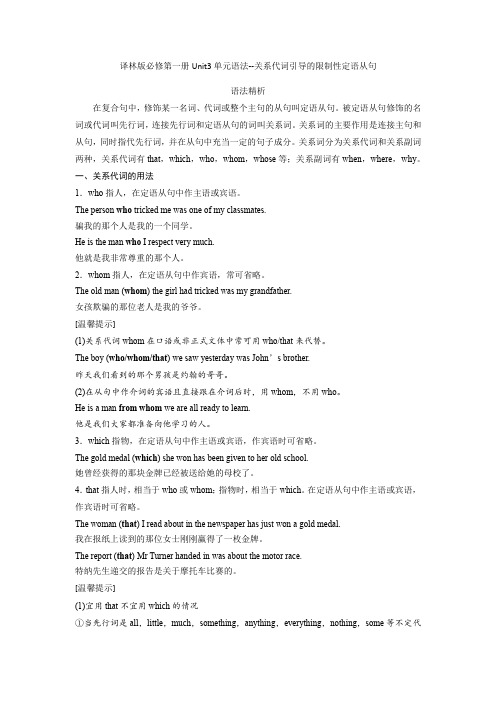
译林版必修第一册Unit3单元语法--关系代词引导的限制性定语从句语法精析在复合句中,修饰某一名词、代词或整个主句的从句叫定语从句。
被定语从句修饰的名词或代词叫先行词,连接先行词和定语从句的词叫关系词。
关系词的主要作用是连接主句和从句,同时指代先行词,并在从句中充当一定的句子成分。
关系词分为关系代词和关系副词两种,关系代词有that,which,who,whom,whose等;关系副词有when,where,why。
一、关系代词的用法1.who指人,在定语从句中作主语或宾语。
The person who tricked me was one of my classmates.骗我的那个人是我的一个同学。
He is the man who I respect very much.他就是我非常尊重的那个人。
2.whom指人,在定语从句中作宾语,常可省略。
The old man (whom) the girl had tricked was my grandfather.女孩欺骗的那位老人是我的爷爷。
[温馨提示](1)关系代词whom在口语或非正式文体中常可用who/that来代替。
The boy (who/whom/that) we saw yesterday was John’s brother.昨天我们看到的那个男孩是约翰的哥哥。
(2)在从句中作介词的宾语且直接跟在介词后时,用whom,不用who。
He is a man from whom we are all ready to learn.他是我们大家都准备向他学习的人。
3.which指物,在定语从句中作主语或宾语,作宾语时可省略。
The gold medal (which) she won has been given to her old school.她曾经获得的那块金牌已经被送给她的母校了。
4.that指人时,相当于who或whom;指物时,相当于which。
译林英语必修3Unit3Grammar and usage (共26张PPT)

结构:
主+谓语+ it +宾补(adj/n)+真正宾语
❖ I found it pleasant to be with your family. ❖ We think it our duty that we should help the poor. ❖ He found it hard to finish the work in time.
Example2
❖ Leave the windows closed when nobody is in. ❖ He considered the book interesting. ❖ They painted the wall white.
❖ adjective(adjective phrases)
C. With, bought D. Because, to buy
Homework
❖ 1.Review object complement
❖ 2.Finish the blank filling on page48 and the relevant exercise in the workbook.
变为被动语态时,不定式符号to必须保留
❖They made the boy work twelve hours a day. The boy was made to work twelve hours a
day.
❖People saw the middle-aged man enter the building.
2. He found them ____ at table___. A. sat; to play chess B. sitting; to play chess C. seated; playing chess D. seat; play the chess
译林版高中英语选必三Unit3 Grammar and usage 教案

《英语》(选择性必修·第三册)Unit 3 Back to the pastGrammar and usageI. Learning objectivesBy the end of the lesson, students will be able to:1. identify the use of predictive clauses;2. complete sentences with proper linking words to form predictive clauses;3. write a short paragraph based on given situations, using predictive clauses.II. Key competence focus1. Choose proper linking words to form predictive clauses.2. Make sentences with predictive clauses.III. Predicted area of difficulty1. Compare some linking words such as that and what, why and because, etc.2. Apply predictive clauses in different situations.IV. Teaching proceduresStep 1 Lead-in1. T asks Ss to define history by using the sentence pattern “History is…”, leading to the topic—predictive clauses.T: Boys and girls, what is history? Can you give a definition to history? You may say “History is …”.2. T shows two sentences on the screen after Ss give their answers.(1) History is a dialogue between the present and the past.(2) History is not what you thought. It is what you remember.3. T asks Ss to observe the two sentences and analyse their elements and structures.T: Please mark the sentence elements and structures. As we can see, both of them use SVP. A noun is used as the predictive in the first sentence, while a noun clause is used as the predictive in the second one. We call it a predictive clause.【设计意图:用一个开放式的问题(历史是什么?)激发学生的兴趣,学生可以给出任何不同的定义,然后引导学生观察教师给出的两个句子,引出表语从句的概念。
人教版高中英语必修三Unit3全课件

人教版高中英语必修三Unit3全课件一、教学内容1. Reading and Writing: The millionpound bank note(百万英镑)2. Listening and Speaking: Money matters(金钱问题)3. Grammar: Comparative and superlative adjectives(比较级和最高级形容词)4. Vocabulary: Words related to money and finance(与金钱和金融相关的词汇)二、教学目标1. 学生能够理解并掌握文章《百万英镑》的主要内容和细节。
2. 学生能够运用所学词汇和语法知识,就金钱和金融主题进行讨论和表达。
3. 学生能够提高听说能力,学会在日常生活中运用比较级和最高级形容词。
三、教学难点与重点1. 教学难点:比较级和最高级形容词的用法,以及金钱和金融相关词汇的掌握。
2. 教学重点:文章《百万英镑》的理解,以及听说能力的培养。
四、教具与学具准备1. 教具:多媒体课件、黑板、录音机、磁带。
2. 学具:课本、练习本、词典。
五、教学过程1. 导入:通过展示一组与金钱相关的图片,引导学生讨论金钱在日常生活中的重要性。
2. 阅读理解:学生阅读文章《百万英镑》,教师提问并讲解文章细节。
3. 例题讲解:讲解比较级和最高级形容词的用法,并给出例句。
4. 随堂练习:学生完成教材中的练习题,巩固所学知识。
5. 听力训练:播放与金钱相关的听力材料,学生完成练习题。
6. 口语练习:分组进行讨论,运用所学词汇和语法知识,就金钱和金融主题进行表达。
六、板书设计1. 文章《百万英镑》2. 比较级和最高级形容词的用法3. 金钱和金融相关词汇七、作业设计a. 选择题:选出正确的比较级或最高级形容词。
c. 写作:以“金钱观”为主题,写一篇短文。
答案:见教材附录。
八、课后反思及拓展延伸2. 拓展延伸:鼓励学生阅读与金钱和金融相关的课外文章,提高阅读和听说能力。
人教版(2019)必修三Unit 3 diverse cultures grammar课件(20张)

【探究总结】
在由并列连词 ________、________、________等连接的并
列句中,
【应用实践】
完成句子。 ①吉米从自行车上跌了下来,但(他)没有受伤。
Jimmy fell off his bike, but
.
②彼得通过了考试,而比尔没有通过。
Peter passed the test but
▶He’s the man (who/that) you can safely depend on. 他是你能放心信赖的人。 ▶There are many plays (that) I’d like to see. 有很多话剧我想看。 ▶We don’t like the way (that/in which) he does the job. 我们不喜欢他工作的方式。 【探究总结】 (1)在限制性定语从句中,当关系代词在定语从句中作 _________ 且前面无介词时,这个关系代词可以省略。
haven’t seen you for ages. ②Sounds like a good idea.
I sounds like a good idea.
I t
二、并列句中的省略
【观察思考】
▶She came back and (she) turned on the TV.
她回来了,然后打开电视。
.
②他解决这道题的方法很有创造性。
The way
is very creative.
答案: ①he has ever seen ②he solved the problem
四、不定式的省略 【观察思考】 ▶—Would you like to go swimming with us? 你想和我们一起去游泳吗? —Well, I’d like to (go swimming with you). 好,我愿意。 ▶—I heard that you would go to Dalian for your holiday. 我听说你要去大连度假。 —I planned to (go to Dalian), but I have some important business to deal with. 我原计划去的,但有重要的事情要处理。
必修三 unit3 宾语从句 Grammar
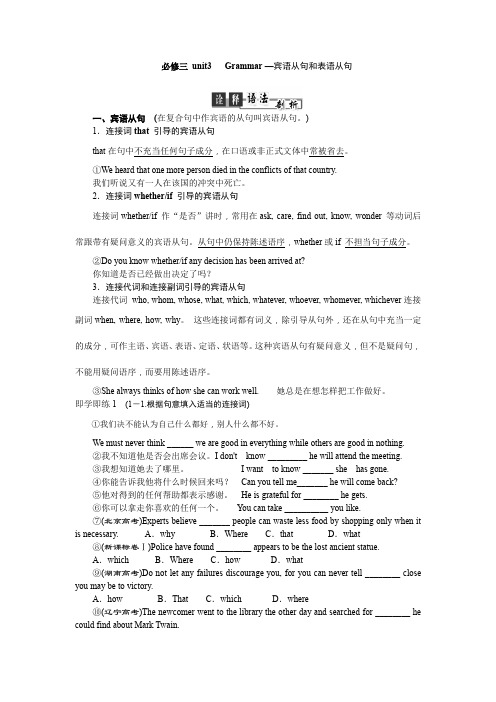
必修三unit3 Grammar —宾语从句和表语从句一、宾语从句(在复合句中作宾语的从句叫宾语从句。
)1.连接词that 引导的宾语从句that在句中不充当任何句子成分,在口语或非正式文体中常被省去。
①We heard that one more person died in the conflicts of that country.我们听说又有一人在该国的冲突中死亡。
2.连接词whether/if 引导的宾语从句连接词whether/if 作“是否”讲时,常用在ask, care, find out, know, wonder 等动词后常跟带有疑问意义的宾语从句。
从句中仍保持陈述语序,whether或if 不担当句子成分。
②Do you know whether/if any decision has been arrived at?你知道是否已经做出决定了吗?3.连接代词和连接副词引导的宾语从句连接代词who, whom, whose, what, which, whatever, whoever, whomever, whichever连接副词when, where, how, why。
这些连接词都有词义,除引导从句外,还在从句中充当一定的成分,可作主语、宾语、表语、定语、状语等。
这种宾语从句有疑问意义,但不是疑问句,不能用疑问语序,而要用陈述语序。
③She always thinks of how she can work well. 她总是在想怎样把工作做好。
即学即练1 (1-1.根据句意填入适当的连接词)①我们决不能认为自己什么都好,别人什么都不好。
We must never think ______ we are good in everything while others are good in nothing.②我不知道他是否会出席会议。
I don't know _________ he will attend the meeting.③我想知道她去了哪里。
译林版高中英语必修3讲义Unit 2 Section Ⅲ Grammar——名词性从句(Ⅱ)与it作形式主语
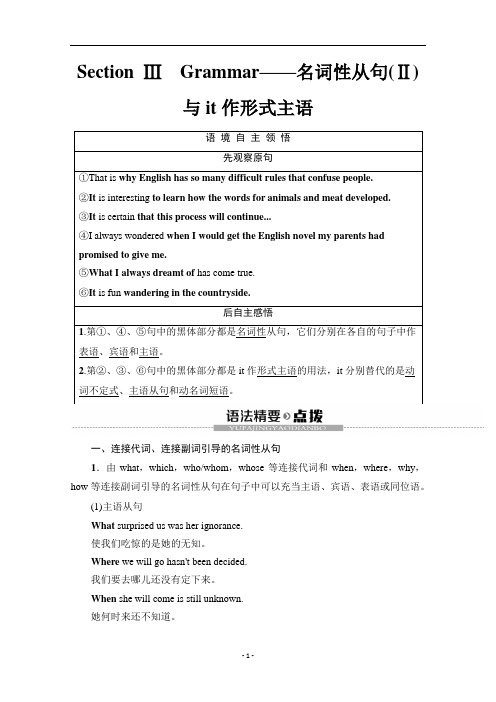
Section ⅢGrammar——名词性从句(Ⅱ)与it作形式主语语境自主领悟先观察原句①That is why English has so many difficult rules that confuse people.②It is interesting to learn how the words for animals and meat developed.③It is certain that this process will continue...④I always wondered when I would get the English novel my parents had promised to give me.⑤What I always dreamt of has come true.⑥It is fun wandering in the countryside.后自主感悟1.第①、④、⑤句中的黑体部分都是名词性从句,它们分别在各自的句子中作表语、宾语和主语。
2.第②、③、⑥句中的黑体部分都是it作形式主语的用法,it分别替代的是动词不定式、主语从句和动名词短语。
一、连接代词、连接副词引导的名词性从句1.由what,which,who/whom,whose等连接代词和when,where,why,how等连接副词引导的名词性从句在句子中可以充当主语、宾语、表语或同位语。
(1)主语从句What surprised us was her ignorance.使我们吃惊的是她的无知。
Where we will go hasn't been decided.我们要去哪儿还没有定下来。
When she will come is still unknown.她何时来还不知道。
(2)宾语从句The school was built on what used to be a wasteland.这所学校是在以前的荒地上建造的。
Unit 3 Grammar and usage 课件-2022高中英语牛津译林版(选择性必修第三册

1) History is a dialogue between the present and the past.What is history?History is ……2) History is what you remember.a noun phrase a noun clauseS+V+P Predictive ClausesOne historian is worthy to be mentioned in the course of Chinese history.He is acknowledged as the father ofChinese history for his masterpiece—— the Shiji.Task 1: Read the passage on P34 and answer the question: What contributed to Sima Qian’s success as a great historian? His interest in history (his father’s influence),his learning of Chinese classics,his extensive traveling across the country,his position as Grand Historian,his diligence,his perseverance/strong-will.对... ...感兴趣周游全国 获取广泛的信息 接替他父亲成为太史令 方便他接触... ... 整理可用的资源 take an interest in ...travel extensively across the countryget a wide range of informationsucceed his father as Grand Historian facilitate his access to ...sort out available resources需要艰苦的努力有效且高效地继续某事被关进监狱身体上和精神上无论顺境还是逆境require painstaking efforts effectively and efficiently carry on with ...be put in prison physically and mentallyin good times or bad timesTask 2: Read the passage again and find the sentences with predicative clauses.Learning and travelling were exactly what helped him in his later career as a historian.His father’s dream was that one day he could write a great masterpiece recording what had happened in history. His chief concern was whether he could do his job more effectively and efficiently.Working out the rules•We can use a noun clause as the predicative of asentence.•We can use that to introduce a predicative clause whenthe clause is a (1) _________. We can use whether tointroduce a predicative clause when the clause is a (2) _____________. We can use what , why , when , where , etc. to introduce a predicative clause when the clause is a (3) ___________.statement yes-no questionwh-questionlinking verbsbesensorylook,sound,smell,taste,feel,touchbecome,go,turn,fall,come,get,grow,runthe changeto continueto be (状态)remain,stay,keepto give theimpressionof being ordoing sthseem,appearturn out,provethe resultThe question is what caused the accident . That mountain is no longer what it used to be.The problem is whose work is the best.The question is which of us should go.The question is who(m) we should trust .1. 连接代词who, what, which, whom, whose, whatever, whoever, whomever, whichever 在从句中作主语、宾语、表语或定语,本身具有语义。
人教版必修三教师用书:Unit+3+Section+Ⅲ Grammar——宾语从句和表语从句
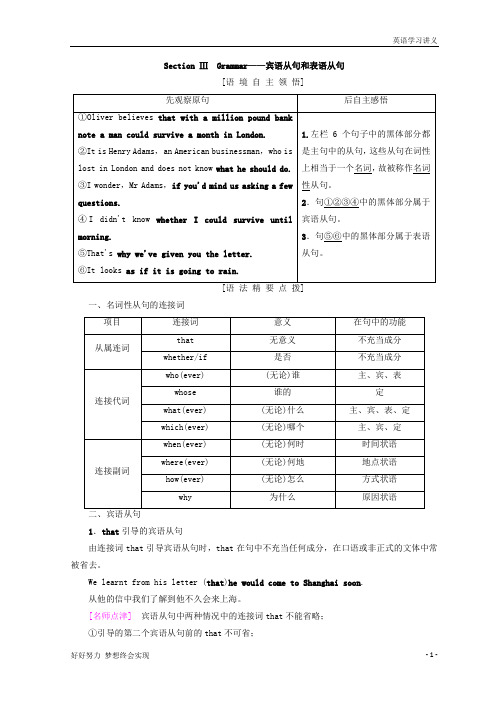
Section ⅢGrammar——宾语从句和表语从句[语境自主领悟]一、名词性从句的连接词1.that引导的宾语从句由连接词that引导宾语从句时,that在句中不充当任何成分,在口语或非正式的文体中常被省去。
We learnt from his letter (that)he would come to Shanghai soon.从他的信中我们了解到他不久会来上海。
[名师点津]宾语从句中两种情况中的连接词that不能省略;①引导的第二个宾语从句前的that不可省;②在动词+形式宾语it+宾语补足语+that引导的宾语从句中that不能省略。
He said(that)you were too young to understand the matter and that you were asked not to care about it.他说你太年轻,还无法理解这件事情,你也不要去管它。
We think it important that every citizen should obey the traffic rules.我们认为每个市民都应该遵守交通规则是很重要的。
[即时训练1]单句改错①He said he would give up the chance and he would try hard to look for another one.在and后加that②We found it strange no one would take the money.在strange后加that2.whether或if引导的宾语从句whether或if引导宾语从句时,在句中不充当成分,但是含“是否”之意,从句要用陈述语序。
I wonder whether/if we'll finish the task on time.我不知道我们能否按时完成这项任务。
I'll see whether/if I can advise him to accept it.我要看看我是否能劝他接受。
Unit+3+Grammar+and+usage高中英语牛津译林版(2020)选择性必修第三册

pay attention to it.
4. The museum was closed. That was __w_h__y__ we couldn’t
see the historical documents.
one I should read first! I should read which one first
2. The truth is _t_h_a_t__ there are many reasons why wars
break out.
3. We have made it rule that visitors must not touch the
historic destinations. That is __h_o_w___ we learn about
important events in history.
In the first century BCE, Sima Qian completed the Shiji, which describes historical events and figure from the era of the Yellow Emperor in ancient legends to his own time.
内选择which, whichever 缺宾语:指人whom/whomever, 指物what/ whatever,指物、强调在范
围内选择which, whichever 缺状语:指时间when,指地点where,指原因why,指方式how 缺定语:指人whose,指物what/whatever,指物、强调在范围内选
英语:必修3 Unit3 The Million Pound Bank Note-Grammar课件(人教新课标)
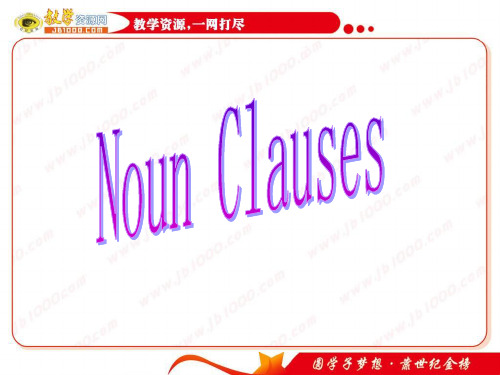
单项选择
1. The young man asked _____ it's summer or D winter. B. that C. weather D. whether A 2. We don't know ______ they did it. A. how on time. A. that B. if C. when D. what time B. who C. what D. which B 3. The teacher asks us ____ Jim can come back A. either
9. Could you tell me how long ________? B A. you have bought the watch B. you have kept this science book C. have you been away from China D. have you been a member of Greener China 10. He says that if it ______ tomorrow, he C _____ fishing. A. will rain, won't go C. rains, won't go B. rained, wasn't go D. rain, will go
一、Object Clauses 宾语从句
I
主语
know him . (简单句 简单句) 简单句
谓语 宾语
I
主语 主
know who
谓语 句
he
iபைடு நூலகம் . (复合句 复合句) 复合句
连词 从句主语 从句谓语 宾语从句
I don’t like what he does every day. He told us that they were good doctors. Do you know when he will come? I often wonder if/ whether animals have the same senses as humans.
必修3 Units3-5 Grammar 主谓一致

Unit3 Grammar 主谓一致学习目标1.知识与能力目标:掌握并运用“主谓一致”2.过程与方法目标:通过讲解和练习掌握“主谓—致”3.情感态度与价值目标:培养对语言的审美能力二、预习导读单1.理解主谓一致的概念。
2.掌握主谓一致的用法。
—、主谓一致的概念:主谓一致是指一个句子的主语和谓语动词之间在“人称”和“数”的方面的一致关系。
例如:1.The house is empty.2.They have already arrived.二、主谓一致的指导原则:现代英语主谓一致主要遵循以下三条原则:1.语法—致原则。
主语是单数,谓语动词用单数形式:主语是复数,谓语动词用复数形式。
2.意义一致原则。
主语和谓语的一致不是由主语的语法形式来决定,而是由主语所表达的意义而决定。
3.就近原则。
谓语动词的单、复数取决于最靠近它的主语。
由either…or,neither…nor,not only…but also连接或由here,there等引导的句子,谓语动词遵循这一原则。
(—)语法一致原则语法一致的原则是指谓语动词和它的主语在语法形式上必须取得一致,即主语是单数形式,谓语动词也要用单数形式,主语是复数形式,谓语动词也要用复数形式。
如:1.The boy shows his mother much attention.这个男孩对母亲很照顾。
2.The boys are playing outside.这些男孩正在外面玩耍。
(二)意义一致原则谓语动词和主语的一致是由主语所表达的单、复数概念来决定的,而不是根据主语的实际语法形式。
有时主语的语法形式是单数,但所表达的概念是复数意义,这时动词应采用复数形式。
如:1.The class are listening to me.全班学生正在听我的讲课。
(the class被视为若干个体)2. Five minutes is enough.五分钟就够了。
(five minutes 表—个数目,被视为一个整体)(三)就近原则就近原则是指谓语动词的人称和数要在形式上与最靠近它的那个名词或者代词取得一致。
高中英语必修三教师用书:Unit 3 Section ⅢGrammar—宾语从句和表语从句 含答案
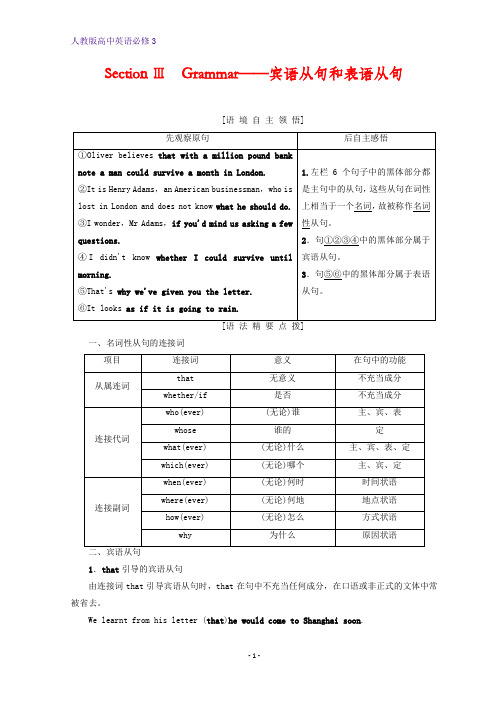
Section ⅢGrammar——宾语从句和表语从句[语境自主领悟]一、名词性从句的连接词1.that引导的宾语从句由连接词that引导宾语从句时,that在句中不充当任何成分,在口语或非正式的文体中常被省去。
We learnt from his letter (that)he would come to Shanghai soon.从他的信中我们了解到他不久会来上海。
[名师点津]宾语从句中两种情况中的连接词that不能省略;①引导的第二个宾语从句前的that不可省;②在动词+形式宾语it+宾语补足语+that引导的宾语从句中that不能省略。
He said(that)you were too young to understand the matter and that you were asked not to care about it.他说你太年轻,还无法理解这件事情,你也不要去管它。
We think it important that every citizen should obey the traffic rules.我们认为每个市民都应该遵守交通规则是很重要的。
[即时训练1]单句改错①He said he would give up the chance and he would try hard to look for another one.在and后加that②We found it strange no one would take the money.在strange后加that2.whether或if引导的宾语从句whether或if引导宾语从句时,在句中不充当成分,但是含“是否”之意,从句要用陈述语序。
I wonder whether/if we'll finish the task on time.我不知道我们能否按时完成这项任务。
I'll see whether/if I can advise him to accept it.我要看看我是否能劝他接受。
人教版高中英语必修三单元三Book3 Unit3 Grammar 宾语从句

一、that引导的宾语从句
that 在从句中 不充当成分,无词义,可以省略。
I hear that he will be back in a month.
1) We think (that) she is hard-working and that she will succeed.
2) I know nothing about him except that he is living in Beijing.
5W.在hdeistchuessr之后
We discuss _________ we should close the store.
whether
练一练: whether / if 1. I asked her w__h_e_t_h_e_r_/_i_f she had a bike. 2. We’re worried about _w__h_e_t_h_e_r he is safe. 3. I don’t know __w_h_e_t_h_e_r he is well or not. 4. I don’t know _w_h_e__th_e_r_ or not he is well. 5. I don’t know _w_h_e__th_e_r to go.
什么是名词性从句?
在句子中起名词作用的句子叫名词性从句。 在句中作主语、宾语、表语、同位语的句子叫 名词性从句。
主语从句 ( The Subject Clause)
名 词 宾语从句 ( The Object Clause) 性 从 表语从句 ( The Predicative Clause) 句
同位语从句 ( The Appositive Clause)
1. What he does is important.
- 1、下载文档前请自行甄别文档内容的完整性,平台不提供额外的编辑、内容补充、找答案等附加服务。
- 2、"仅部分预览"的文档,不可在线预览部分如存在完整性等问题,可反馈申请退款(可完整预览的文档不适用该条件!)。
- 3、如文档侵犯您的权益,请联系客服反馈,我们会尽快为您处理(人工客服工作时间:9:00-18:30)。
作 状
语
现在分词作状语。表时间、原因、条件、结 果、伴随(方式)等。
Hearing the cry for help, he rushed out.(时间)
Being ill, he went home. (原因)
Seeing from the hill, you can get the whole town.(条件) European football is played in 80 countries, making it the most popular sport in the world. (NMET 98)(结果) He read a magazine waiting for the bus.(伴随)
现在分词作状语
1. Having finished the work, they left for home. 2. Not having received his letter, the mother wrote to her son again. 3. Having been told for many times, the student still didn’t know the answer. 4. When playing on the ground, he saw some money on the floor. 5. When asked about his secret of success, the man kept silent. 6. Dressed in a white coat, he looks like a doctor.
只接动名词作宾语的常见动词 有十六个:resist、mind、 suggest、delay、keep on、 look forward to、enjoy、 include、 appreciate、imagine、practise、 finish、succeed in、consider、 can’t help、miss。 太多了,怎么记呀?
C us to the ball. 8.We appreciate_________ A.them to invite B.to invite C.their inviting D.being invited
9.She returned home only to find the door open and something C _______. A.missed B.to be missing C.missing D.to be missed
C 5.________the exam, the boy was punished by his father. A. No passing B. Having passed C. Not passing D. Not having passed
C 6. Time________, I can have done it better. A. permit B. be permitted C. permitting D. to permit
3. Being exposed to the sun is harmful to our health.
4.It’s useless taking this kind of medicine. (no good, no point)
作表语
( 1 )动名词 ( 强调行 为) 1.My job is teaching. = Teaching is my job. 2.Her full-time job is laying eggs. =Laying eggs is her full-time job.
( 2 )现在分词(强调性 质) 1.The play is exciting. ≠ Exciting is the play. 2.The story he told us was very interesting. ≠Interesting was the story he told us.
作宾语:动名词
能跟现在分词作宾语补足语的常见 动词有这些,看看有什么好方法可 以将它们记住: make、let、have、look at、see、 watch、hear、listen to、notice、 feel。
对了,用“三让、三看、两 听、注意感觉”。多简单!
作定语
⑴动名词作定语表示性质或用途。
a washing machine
C the problem of old age. 10.She decided to devote herself _______ A.to study B.studying C.to studying D.study .
B 1. He sent me an E-mail, _______ to get further information.(2000上海卷) A. hoped B. hoping C. to hope D. hope D 2. - We slept with the light________ all night long last night. A. burnt B. to burn C. being burnt D. burning
C
D.to be laughed
2.You must do something to prevent your house__________. A.to be broken in B.from being broken in C.to break in D.from breaking in 3.They insisted on ______another chance to try. A.given B.giving C.being given D.to be given 4.—Where is my passport? I remember ________it here. —You shouldn't have left it here. Remember ________it with you all the time. A.to put;to take B.putting;taking C.putting;to take D.to put;taking 5.His room needs _______, so he must have it _________. A.painting; painted B.painted; painting C.painting; painting D.painted; painted
= a machine for washing
a swimming pool
= a pool for swimming This is a new washing machine.
作定语
⑵现在分词作定语表示动作。如果是单词,放在被
修饰的名词前;如果是短语,放就放在被修饰的名 词后。
•a developing country = a country which is developing •a sleeping boy= a boy who is sleeping •The man talking with my father is Mr. Wang. •China is a developing country.
B
B
C
A
6.After finishing his homework he went on parents. A.write B.writing C.wrote
_______a letter to his D
D.to write
7.The young trees we planted last week require _______ C with great care. A.looking after B.to look after C.to be looked after D.taken good care of
B 3. The brave man died, ________ his young wife nothing but a________ cottage. A. left; breaking B. leaving; broken C. left; broken D. to leave; breaking C 4. ________hard before, Tom is afraid of failing in the exam. A. Having been worked B. Not to have worked C. Having never worked D. Never have worked
•I have just finished doing my home work. •I suggested asking his brother for some money. •He keeps buying expensive maps. He must have more than 200 by now. 4.He imagined being praised by others.
别着急,我们来动动脑 筋。有了,你看:
抗议推迟盼喜报, 心想练成考不错
作宾语补足语:现在分词 I heard the girl singing in the classroom. I noticed a long queue outside the bank waiting for it to open. The baby watched his dad shaving his face with great interest. With the boy leading the road, we found the place easily. He found himself surrounded by others.
1.The boy reading a book under the tree is Tom. 2. The patient being treated is a VIP. 3. The house being built is my home. 4. the falling leaves the fallen leaves the boiling water the boiled water the developing countries the developed countries
